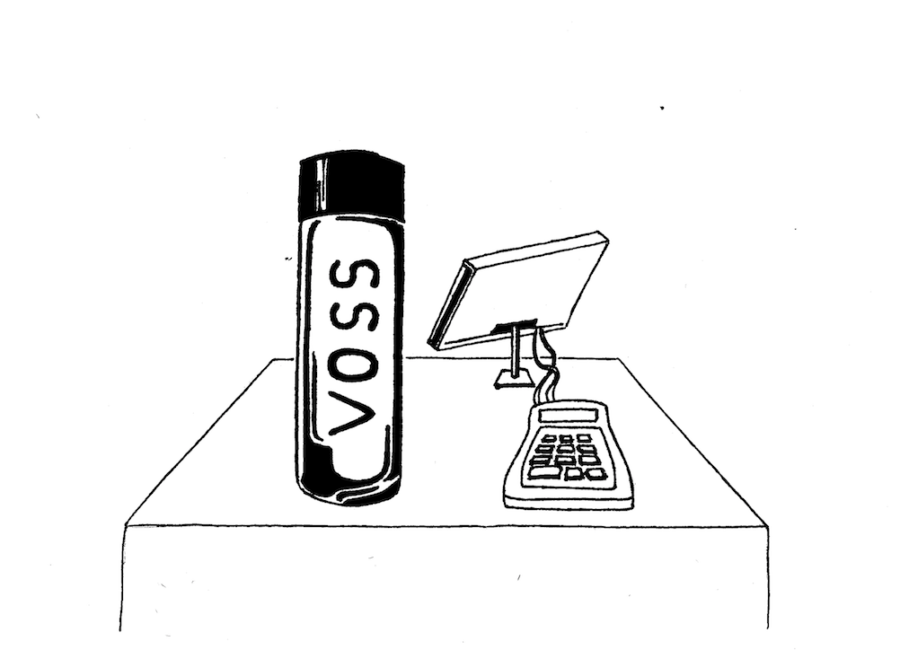Editorial: It’s time for Urban to boycott bottled water
As of this May, hundreds of VOSS water bottles can be seen strewn around Urban classrooms and knocked over next to recycling bins. While Flik recently replaced the sale of plastic LIFEWTR water bottles with more sustainable glass VOSS water bottles, the process of packaging, transporting and chilling any form of bottled water still has a large environmental impact. As a community that prides itself on the core value of “instill[ing] in students a sense of mission and purpose as citizens of the larger community and world,” it is wrong that Urban students continue to buy a product that is so destructive to the health of the global community.
While buying a glass water bottle from a school cafeteria may seem insignificant when compared to the daunting amount of waste generated by humans, this small consumer habit has a surprisingly large environmental impact. Although the switch to VOSS from LIFEWTR water in recent months has significantly reduced Urban’s plastic waste, buying both plastic and glass bottled water has become an epidemic across the country.
According to Business Insider, the sale of bottled water increases 10% annually. The Beverage Marketing Corporation reported that as of 2017, bottled water became the most popular beverage purchased in the United States.
VOSS markets its glass water bottles as single or multiple use containers, so, even though people may refill their VOSS bottles, most will ultimately end up in trash and recycling piles, next to millions of other discarded bottles, plastic and glass alike.
National Geographic also found that it takes up to three liters of tap water to produce one liter of bottled water. Tree Hugger, an environmental media outlet, reports that, while significantly less impactful than plastic, the production of glass releases over 4,000 pounds of CO2 per ton of glass.
Each VOSS water bottle has to travel over 5,100 miles to reach San Francisco from Norway. The environmental impact of transporting VOSS water across the globe further contributes to the pollution generated by Urban students’ unnecessary consumption. Urban is not alone in indulging in this harmful habit; according to The Guardian, one million water bottles are bought globally every minute.
In addition to the transportation impact of each VOSS water bottle, the marketing of the brand and the glass containers may even promote guilt-free consumption, the false belief that purchasing this brand does not negatively impact the environment. Through the guise of labeling these bottles as “Norwegian artesian water,” VOSS is attempting to play to cosmopolitan culture, in turn commodifying a metropolitan sensibility. These sleek bottles are representative of the growing trend of brands using packaging that evokes artistic aesthetics to appeal to an emerging ‘premium’ bottled water market. Despite marketing the water as “artesian,” in 2010, Norway’s TV 2 reported that VOSS uses the same source as the tap water from the Norwegian municipal water supply.
In buying VOSS water, Urban students are purchasing Norwegian tap water while their own San Francisco tap water is over 1,800 times less expensive and ranked by the San Francisco Public Utilities Commission as one of the cleanest water sources in the world.
In addition, the Environmental Working Group reported that, unlike tap water, the bottled water industry can hide the results of its quality testing: only one of the ten most popular bottled water brands actually provide information about the source, purification methods and chemical pollutants in their products. Ironically, by attempting to ensure the purity of the water we drink by buying artisan, extra-filtered bottled water, we are further polluting our water supply.
While some people argue that it is okay to buy glass VOSS water bottles because they are easily recyclable, putting your bottle in the blue bin does not ensure that the bottle will actually be recycled. The Urban community cannot rely on a commitment to recycling to excuse buying glass water bottles when, according to the Atlantic, only 50% of what goes into our recycling bins is fully recycled.
As part of a generation that will inherit an increasingly polluted world, it is time that Urban students take a stand and use their power as consumers to boycott VOSS bottled water, and all other bottled water brands.

